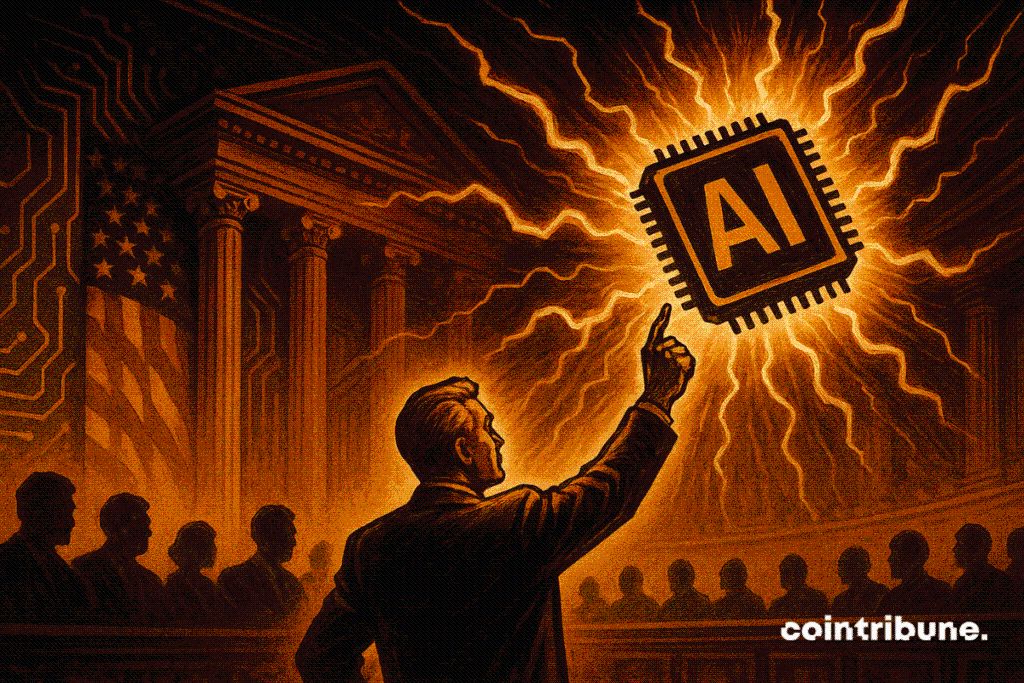GAIN Act: The US Senate Passes a Law That Could Disrupt the AI Chip Industry
The United States seems determined to dominate everything: not only the markets but also the processor cores, the AI race, and the global digital infrastructure. The GAIN Act requires AI chip manufacturers to serve American customers first before any export. Is this a security maneuver or an imperial ambition? Should everything be seized and controlled starting today? This text could redraw the global technological balance, at what cost for the rest of the world and for cryptomining?

In Brief
- The GAIN Act reserves AI chips for US companies before any foreign export.
- The Senate validates this strategic law by 77 votes to 20 despite industrial reluctance.
- Nvidia and others denounce a market closure to the detriment of global innovation.
- Crypto miners find themselves trapped, facing cost increases and logistical delays.
GAIN Act: A Technological Patriot Act
The GAIN Act inserted into the NDAA 2026 establishes a strong rule: before exporting artificial intelligence or HPC chips, manufacturers must fulfill orders from the US market. Congress reserves the right to ban export licenses on the most advanced circuits. This national priority logic echoes the trajectory of the Patriot Act: enhanced control, limitation of foreign use.
The Senate approved the text with 77 votes in favor, 20 against. According to Americans for Responsible Innovation: “In the Senate, placing the United States first is considered a badge of honor“.
Their chairman Brad Carson states :
As we work to maintain the United States’ lead in AI development, we need advanced AI chip manufacturers to sell to American companies first before addressing countries considered concerning. The GAIN AI Act constitutes a major victory for the United States’ economic competitiveness and national security.
This alliance between technological sovereignty and militarization of export control marks a leap: AI becomes a regulated border, not an open resource for global trade.
AI & USA: “America First” or Technological Isolation?
Adopting an AI version of “America First” means fencing innovations off: only American actors benefit first. The GAIN Act forces chip sales first to American customers, even if foreign partners need them. This approach is part of a broader policy.
The White House, via one of its advisors, David Sacks, attempted to remove this provision from the text, arguing that it would slow down technology export expansion.
In their letter to the Senate, ARI and American Compass remind that AI has a dual dimension between civil technology and national security: prioritizing the domestic market would prevent competitors from surpassing the United States.
The risk? That non-American AI startups are disqualified from the international game. By trying to lock the domestic AI chain, the USA could isolate their market. The global AI ecosystem risks fragmenting. The challenge: reconcile sovereignty and openness — without stifling innovation.
Cryptominage in the Trap: Signals to Watch
The GAIN Act does not explicitly mention crypto mining. However, it affects a key use of GPUs and high-performance chips that miners use to secure blockchains. CleanSpark has already been ordered to pay 185 million USD for contested imported equipment; IREN faces a claim of 100 million USD.
These figures illustrate the fragility of the system. These disputes show that the commercial framework of crypto equipment is already under strain.
Here are 5 signals to watch:
- October 9, 2025: adoption of the GAIN Act in the Senate (77 for / 20 against);
- Manufacturers like Nvidia must reserve chips for US customers before export;
- CleanSpark: $185M claimed by customs;
- IREN: $100M in potential debts;
- Possible migration of operations to freer jurisdictions.
These elements point to a risk of hardware congestion for mining. Fewer chips available = cost increases = lower profitability.
Moreover, a drop in the US hashrate could weaken the United States’ position in the global cryptosphere infrastructure. The text thus threatens not only AI giants but also decentralized web actors.
When Donald Trump unveiled his strategy for AI , he did not mince words: he wants the United States to dominate technology without compromise. The GAIN Act fits into this trajectory, creating a framework supposed to protect American AI. But in this quest for control, crypto miners, AI startups, and global innovation also risk paying the price.
Disclaimer: The content of this article solely reflects the author's opinion and does not represent the platform in any capacity. This article is not intended to serve as a reference for making investment decisions.
You may also like
Spirit Blockchain Faces Leadership Challenges as Interim CFO Navigates Regulatory Uncertainty
- Spirit Blockchain filed interim financial reports and MD&A for Q3 2025, with CEO Lewis Bateman serving as interim CFO after Inder Saini's departure. - The blockchain infrastructure firm focuses on recurring revenue through licensing and digital asset support, navigating regulatory risks and market volatility. - A separate SPIR-listed Spire Global faces NYSE delisting risks for missing filings, creating potential investor confusion between the two unrelated companies. - Bateman's dual role may streamline

ZEC drops 20.91% in a week as surging retail activity heats up the futures market
- Zcash (ZEC) rose 0.28% in 24 hours but fell 20.91% weekly amid volatile derivative markets and shifting demand. - Stagnant shielded pool activity, including the Orchard and Sapling pools, signals weakening demand for ZEC's privacy features. - Overheated retail-driven futures markets and declining open interest highlight risks of sharp corrections after historical patterns. - ZEC approaches critical $436 support level, with analysts warning of potential 30% declines if technical indicators break.

DASH Rises 54.08% Over the Past Year as Institutions Invest and Earnings Announced
- DoorDash (DASH) surged 54.08% in 12 months amid strong institutional buying, including Jefferies' 40.7% stake increase and Vanguard's $10.15B holdings. - Q3 earnings missed estimates ($0.55 vs $0.68) but revenue grew 27.3% to $3.45B, with analysts maintaining "Moderate Buy" ratings and $275.62 average price targets. - Insider sales totaling $15.4M contrasted institutional confidence, as DASH trades at $81.1B market cap with 95.47 P/E ratio, reflecting long-term growth bets in on-demand commerce.

Ethereum Updates Today: Vitalik Buterin: Privacy Should Be Considered Digital Hygiene, Not an Exclusive Privilege
- Ethereum co-founder Vitalik Buterin donated 256 ETH ($800,000) to privacy-focused messaging platforms Session and SimpleX, advancing metadata privacy in digital communication. - The platforms use decentralized infrastructure and avoid centralized identifiers, addressing vulnerabilities in traditional messaging systems through unique approaches like service nodes and user-controlled servers. - Buterin's move counters EU regulatory pressures on encrypted messaging, emphasizing privacy as a fundamental righ

